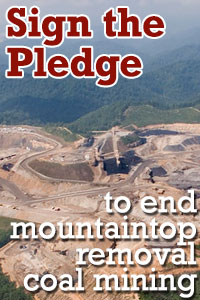Communities, Welcome to the Community of Rawl, West Virginia
“The water runs out of the pipe like tomato soup: thick with orange sediment.” – Donetta Blankenship, resident of Rawl, WV
Friday, October 19th, 2007
Donetta Blankenship has lived in Rawl for about six years. Before she and her family moved to Rawl, they had no health problems. Since moving there, Donetta has been hospitalized for liver failure twice in the last year. Her mother-in-law suffers from pancreatitis. And whenever anyone in the family showers, they get a headache from the rotten egg smell caused by nitrogen sulfate in the water. Donetta has two children, a thirteen-year-old girl and a fourteen-year-old boy, and two stepchildren. Her stepdaughter, at the age of 19, had her gallbladder removed. Since they’ve moved to Rawl, both her children have developed asthma. Her daughter has stomach problems; her son has bumps all over his back and refuses to bathe in the contaminated water that makes it worse. He also has trouble sleeping at night, worrying that the sludge impoundment above their home will give way. Donetta stays because she can’t afford to move her family elsewhere.
In 2005, scientists at Wheeling Jesuit University released a study indicating that water tested in private wells in Rawl, West Virginia exceeded federal drinking water standards for arsenic, lead, iron, aluminum, beryllium, barium, manganese and selenium. Though Massey Energy denied any correlation between nearby mountaintop removal mining operations and the elevated toxin levels, the toxins found in the water are commonly found in coal sludge.
A branch of Massey energy admitted to having pumped millions of gallons of coal sludge into underground reservoirs near Rawl in the 1980s. Ten years ago, a blast powerful enough to shatter windows in a nearby church and homes resonated throughout the Rawl area. Shortly after, the water started to go bad, and residents believe the same blast that destroyed the foundations of dozens of homes may have cracked the barrier between the buried sludge and the aquifer that provides Rawl’s city water. Currently, Donetta says, sometimes the water, “runs out of the pipe like tomato soup: thick with orange sediment.”
Donetta and over 700 other residents of the area filed a lawsuit against Massey Energy, but to date have not received any relief. Donetta says that if they win, they’ll use the money to move elsewhere. They have been working with the Ohio Valley Environmental Coalition and the Sludge Safety Project to safeguard the health of their families and community.
Story written by Lauren Benningfield and Anna Santo and provided courtesy of Appalachian Voices. Photo by Kent Kessinger provided courtesy of Appalachian Voices and Southwings









